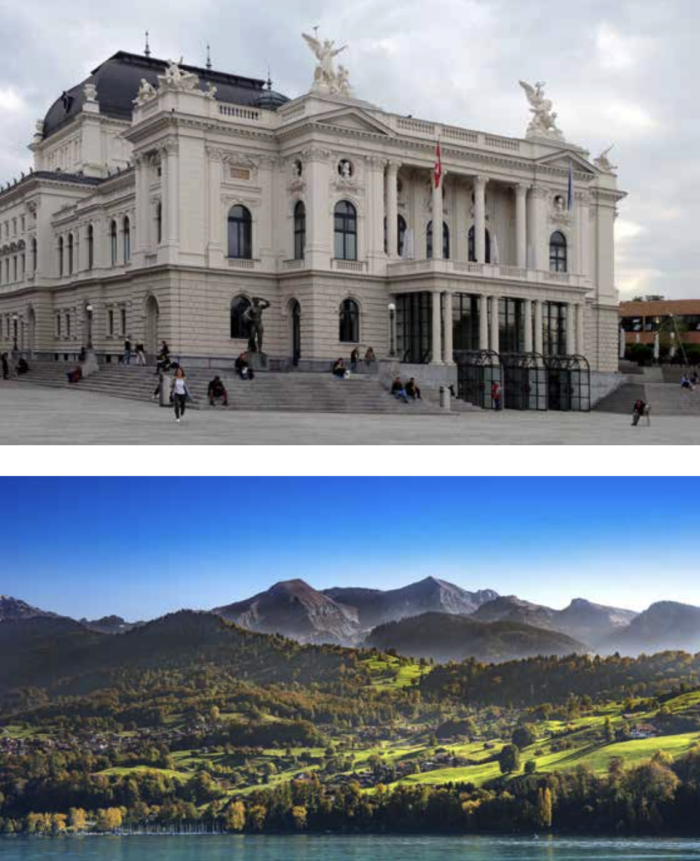Switzerland was formed in 1291 by an alliance of cantons against the Habsburg dynasty. It only became a nation though in 1848 after a new constitution was written. Before 1848, internal conflict was quite common, but Switzerland has enjoyed relative domestic peace since the mid-19th century. Also, its organisation has remained essentially the same as it is a union of more than 3,000 communes or municipalities.
Ordinary citizens are able to participate at every level of politics and regularly participate in referenda and initiatives. Two effects of this popular involvement are low taxes by European standards, and slow political decision making as every individual has a right to be heard. This blend of federalism and direct democracy is unique and is considered the reason for the country’s economic success. And, Switzerland is a major economic power, thanks to its long tradition of financial services and high-quality, specialised manufacturing of items such as precision timepieces, optics and pharmaceuticals. On top of this, Switzerland is regularly ranked to be among the countries in the world with the highest standards of living.
Principal Industries in Switzerland
The banking and finance sectors along with tourism are the biggest sectors for the Swiss economy although their reputation for watchmaking and chocolate is world-renowned.
Other Important Industries
Other important industries include agriculture, metals, chemicals and precision engineering. The tech sector is also making a real impact in Switzerland, particularly in the healthcare sector.
Doing Business in Switzerland
Switzerland may be small but that’s no reason to underestimate it as a place to do business. For a start, not only does it have one of the most advanced and competitive economies in the world, but it’s also strategically located between southern, central and western Europe. And, while it’s not a member of the European Union, Switzerland does have access to the EU’s single market.
The country also benefits from being politically stable and having a very transparent legal system making it an attractive location for foreign investors. What’s more, Switzerland is ranked 36 among 190 economies in the ease of doing business index, according to the latest World Bank annual ratings in 2021.
There are numerous advantages to doing business in Switzerland. Among the top reasons would be banking and finance. This is the largest sector in the economy and the Swiss’ reputation for banking expertise along with the country’s financial stability make it an excellent prospect for companies in that domain. Other reasons to be optimistic about doing business in Switzerland include a technologically advanced domestic and international infrastructure, a highly skilled workforce and access to neighbouring European countries.
The View from the Ground
When describing a country and its culture, you can write down all the facts and figures you like but if you want the full story, you need to get the perspective of someone with a lived experience of being there. That’s why we’ve asked Noah to give us his take on what it’s like to live and work in Switzerland.
One thing you shouldn’t do in a Swiss business meeting is try to be too jokey. There is always a bit of small talk but for example, in the UK you would have somebody make a joke at the beginning of a meeting and after 10 minutes, everybody would sit down and then get down to business. In Switzerland though, you can have small talk for five minutes before a meeting but then it’s not a jokey type of atmosphere. Some people think we just get straight down to business but that’s not true. We do like to engage in small talk, perhaps not for as long as in some other countries like Spain, but it does happen.
Because many companies in Switzerland have a heritage and are very traditional, there is a strong sense of hierarchy. If you think about the businesses such as the banks and the watchmaking industry, some of these companies are more than two hundred years old, so there is a strict hierarchy in place. You also respect the people at the top because their names mean a lot.
Switzerland has a very formal setting and for example, I was working in a bank, and it was very traditional. You always had to address each other as Mister or Madam and the dress code required me to wear a suit and tie every day. There was no day when I could wear casual attire. So, in the summer when it can get quite hot, like 35 degrees, that was pretty uncomfortable. You had to be extremely polite at all times and in terms of the hierarchy, it’s very traditional. I don’t like it, but there’s a position for each race or sex, so for me, that’s a very bad part of Swiss culture. On top of this, it is usually just one person who makes the decisions but that can vary by industry. As I said though, most of the industries that Switzerland is famous for are the traditional businesses. So, banks, insurance companies and watchmakers are run by families. For example, some banks have been family owned for generations as well as watchmakers, so it’s generally the person at the top who makes the decisions.
Of course, in the newer industries, it’s quite different. My partner here at Aexus has a Swiss start-up from Zurich and they have a very flat structure. In fact, I think all start-ups seem to have a flat structure and hierarchy. And, this does seem to be part of why they are working so well. What’s more, the start-up scene in Switzerland is very vibrant and part of this is down to our colleges. We have ETH Zurich (the Swiss Federal Institute of Technology) and Ecole Polytechnique Fédérale de Lausanne (EPFL) which are among the best in the world. These colleges attract a lot of students from the Far East as well as the rest of the world. Then, there’s a graduation every year and a lot of students team up to start a company. It also gives existing start-ups a rich pool of talent to hire from and this process repeats itself every year. So, yeah there’s a good start-up scene here, particularly in places like Zurich, Geneva and Lausanne.
Switzerland is a bit of a funny country in that we have a French part and a German part and an Italian part, but somehow, we are all still very proud to be Swiss. You may find it odd but people who live in the French part of Switzerland hate the French. They would never consider themselves to be French or anything like the French. The same is true for Swiss Germans, we can’t stand the Germans. I don’t know so much about the Italians, but Swiss pride is quite strong, and, in that way, we reject the countries that we are labelled as being from. Some people even consider it an offence to be asked if they are Swiss French or Swiss German, to which the answer is always, “No! I’m just Swiss!” I mean yeah, I’m not one of those people but it definitely happens. I’m very international. I’m a broad minded dual national of Germany and Switzerland, with parents from Hungary. And, because of my international outlook, I don’t take national pride very seriously but people in Switzerland do. They take it really seriously. And, despite me talking about national pride and unity, there are still some barriers between the three parts. For example, my sister is a marketing manager at a watch making company and she recently moved from Geneva to Zurich. And, it’s very difficult for people to make this kind of move. Firstly, there is the language barrier and secondly, it’s a very different mindset when going from the French part to the German part.
If there’s one country the Swiss don’t like, it’s France. When Switzerland beat France in the Euros, that was big. Whole towns were partying into the night and dancing in the streets. It was unheard of for Switzerland to beat France at football, so when we did, we were ecstatic. It’s difficult to now counter this with countries that we do like as we don’t really like any of our neighbours. The problem is that the Swiss people have both an inferiority and superiority complex at the same time. So basically, they’re very angry that the countries around them are very big, like Germany and France. And on top of that, they’re annoyed because these countries have long histories, a bigger culture and a united population. So, this is why they hate them, but they also feel superior because they have better salaries, there’s a low crime rate, the streets are cleaner and safer. So, they feel superior in all of these things but at the same time, distinctly inferior. For the Swiss, this creates a lot of animosity towards any country that is right next to them.
One trait of the Swiss is that they like to keep themselves to themselves. It’s not just that we’re not outgoing, it seems to be a mentality of everyone for themselves. We don’t talk to people on the train, actually, we don’t talk to people in general if they’re strangers. So maybe we’re a little introverted. Also, don’t forget that we’re a neutral country where our stance is, “leave us alone and let us be.” So maybe that has got into the national psyche.
This also might explain why it’s not so easy to make friends with someone from Switzerland. I know people who have moved to Switzerland from another country and in 20 years of living there, they’ve made like maybe one or two friends. It’s very difficult. Especially for adults. Even if you’re born and raised in Switzerland, the kids you were friends with at school are the friends you’ll have for the rest of your life.
It is possible to become friends with people you associate with for business. Don’t forget that we’re in a bank, so it’s a very formal setting. But you get on with your colleagues for sure. Everyone is very nice, and you can easily go for a drink with your colleagues. It then depends on whether you want to hang out with them on the weekends too. In business though, there are always nice people and also, many of the cities are international. If you go to Geneva for example, there are always international businesspeople there, so it’s easy to make friends. I’m not so sure the same tactic would work in a tiny town in the German speaking part of Switzerland. Actually, I’m not so sure you’d find friends there either in or outside of work.
Business Etiquette
As you might expect in a country known for its precision timepieces, being late for a Swiss business meeting is inexcusable. Not only is it rude but the Swiss are particular about this, so make sure you are on time or even early to avoid causing unnecessary offence. The Swiss are very conservative, expect politeness and everything to work like clockwork. These values are also extended into business meetings. This means men will be expected to wear a dark suit and tie while ladies will be expected to wear a suit or dress. The greeting is a firm handshake with eye contact. As is typical in many scenarios, there will be a little small talk before getting down to business. The Swiss don’t like to get too intimate with people they don’t know extremely well, so stick to general topics like food or the weather. The meeting itself will follow a strict schedule and everyone is expected to do their best to ensure an agreement is reached. Lastly, while everyone’s opinion is welcomed and valued, there is generally only one decision maker.





